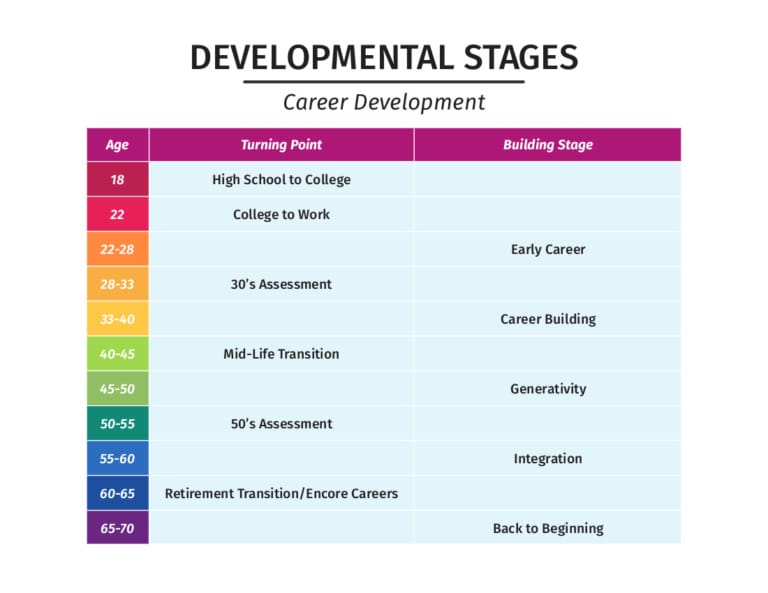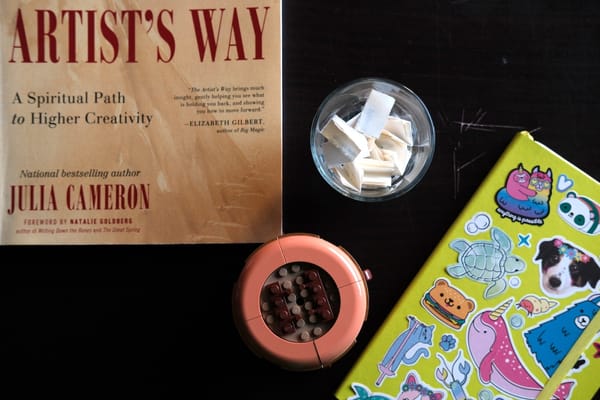The decade: Is it a turning point in your career trajectory?
Five lessons learned from industry workers and an alignment coach

📝 Notes from Jenn:
Today’s article is a long one (2000 words) and my first time publishing an interviewed & reported piece in the newsletter. I know I had said short-form journalism, but who am I to say no when the pieces want to be overachievers? If you enjoy reading it and would like to see more like this, please consider upgrading your subscription to a paid one to support this work and/or share it with others.
❓Source request: Depression meals! We’re coming into winter in the northern hemisphere, and that means seasonal depression! For a tanjennts article, I’d love to talk to you about your favorite depression meal recipe(s).
📜 Published: ICYMI, coffee tattoos!
🛠 Current project: I recently went to a plant swap and came back with five new plants. Fingers crossed that they all survive!
🔏 Last week, paid subscribers received an anxiety spiral on going into too many productivity apps.
🍩 What I ate/drank/snacked on: espresso mule from The Coffee Movement.


The decade: Is it a turning point in your career trajectory?
Five lessons learned from industry workers and an alignment coach
A decade is an incredibly long time for many relationships, be it romantic, friendship, or career. Overall, my industry time is in the teens, but I passed my decade mark in my industry position this year and felt like I was stagnating. Like I should be more something. A higher position, a larger client base, more money, more prestige. Just more. I didn’t know what I wanted or where I wanted to go.
As I’ve come to learn, this is not an uncommon feeling.
In a 2002 research paper, sociologist Corey Keyes introduced a concept called “languishing1,” the in-between state of depression and flourishing. This term was later highlighted in 2021 in a viral New York Times piece2 by Adam Grant, who wrote:
In psychology, we think about mental health on a spectrum from depression to flourishing. Flourishing is the peak of well-being: You have a strong sense of meaning, mastery and mattering to others. Depression is the valley of ill-being: You feel despondent, drained and worthless.
Languishing is the neglected middle child of mental health. It’s the void between depression and flourishing —the absence of well-being. You don’t have symptoms of mental illness, but you’re not the picture of mental health either. You’re not functioning at full capacity. Languishing dulls your motivation, disrupts your ability to focus, and triples the odds that you’ll cut back on work. It appears to be more common than major depression —and in some ways it may be a bigger risk factor for mental illness.
In the face of the languishing feeling, I did what any Very Online millennial would do: I turned to my network. Seventeen people responded to me, 16 of whom were in coffee. The industry experience ranged from 10 to 33 years, and the last position they held spanned many of the ways you can be in coffee: director of sales or marketing, quality assurance, content manager, production roaster, and C-suite.
A lot of this was really for my own reassurance: to know that I’m not so alone in feeling this and that people have successfully “made it” past this decade mark. I asked three questions:
- How did you feel about your career at the 10-year mark of being in this industry? 1 (negative) to 5 (positive)
- Why did you choose this number?
- What advice would you give someone at their decade mark of being in their industry?
On average, the respondents had 19 years of experience and a rating of 3.9/5. I wouldn’t say there was a significant trend of longer-term people being happier in their decision (not enough responses for this), but it certainly felt like those who had stuck around had found their purpose.
Unlike other industries, coffee doesn’t always require you to have a special degree. There aren’t as many “large” companies and, as such, not many corporate ladders to climb. But isn’t that also an appeal? That you could traverse the industry landscape with various careers? You could move from retail to roasted coffee sales, sales to marketing, or marketing to ops. On the flip side, it’s a little more challenging to navigate a career change when there aren’t that many pre-established lines.
In addition to the advice I gathered via the survey, I reached out to Camila Coddou, alignment coach at Sundown Coaching. Given her background as a former coffee professional, I felt that she was particularly well-positioned to offer guidance on how one could navigate this issue.
She shares, “A lot of what I see in my coaching practice with people who have been in the same industry for long periods of time are questions around purpose and alignment.” The clients bring up similar concerns to what I first wrote: work doesn’t feel as good as before, or they no longer identify with it. Belonging, passion, and inspiration are common refrains, she says. “What I see a lot is people have lost the thread of what’s true for them and are instead operating with outdated beliefs about themselves and their needs. And so they find themselves moving towards new positions before getting clear on what they actually want and need from a new role.”
Some disclaimers: this wasn’t a formally designed survey. And, of course, when someone reached their decade mark, the industry and general global economy were not in the same place as it is now3. The respondents were also mainly in the retail/consuming sector of coffee. If I did not receive permission to share their quotes with their name, they’ve been anonymized. This being said, there are takeaways and lessons one could glean that aren’t locked in time.
1. Always be learning
The advice of “never stop learning” was a common one.
“At the 10-year mark, I felt I was just starting to hit my stride,” shares Spencer Turer, Vice President at Coffee Enterprises. In the first decade, Spencer had helped found the Roasters Guild, as well as volunteered, judged, and traveled. “2004 was a great time to be active in the specialty coffee industry—so many important programs were starting, existing coffee companies were expanding into specialty coffee, and new entrepreneurs were getting into the industry.”
With 27 years of experience under his belt, he offers the advice, “Always seek out educational opportunities, both theoretical in the classroom and experiential in the industry. Stay focused on what you need to be successful—which is a broad understanding of the coffee business, specifically the people and the transactions.”
For those who work on bar, someone wrote that your body can only take so much physical labor, “Get out. Whatever it takes. Because your back surgery at 50 is going to be a lot more expensive than a class to learn a new skill to get a new job now.”
2. Examine where you are and what you’ve accomplished
Jen Hurd is in green coffee sales and a 23-year industry veteran. At the decade mark, she recalls making a choice between social work and coffee and feeling “troubled for a while because I felt like I wasn’t contributing positive change to society.” She advises stepping back to see where you are and what you’ve accomplished and asking yourself questions like, “Do you feel valued for your skills and contributions? Are you happy and fulfilled and feeling like there is more to learn?” She adds, “If you’re not getting what you need or want, it’s okay to step away!”
According to the Highlands Company, a career advisement and assessment business, there are six major turning points4 in one’s career life. The second turning point is the college-to-work world, and the third turning point is the 30’s assessment.
Whatever path chosen at the Second Turning Point tends to continue for some five to seven years. In the ages from 28 to 33, you will likely reassess and reevaluate that path.
If an initial path was completely unsatisfactory, it is at this Turning Point that you will start over. Even if your first career choice was a good one, you will likely modify it here to enlarge it or expand it by starting a family or moving geographically, for instance.

Another coffee professional and 15-year industry veteran who experienced burnout and witnessed workplace harassment and intimidation, advises, “Give yourself grace. You’ve been put into impossible situations. You weren’t meant to win/ check all the boxes, and it will be used against you. Take every chance to celebrate what you were able to accomplish.”
3. Think about your next steps
“It's never too late or too early to take stock of where you're at and where you'd like to go next. In fact, if I took my own advice, I'd likely be reconsidering my current professional path at least 3x more than I have in recent years,” shares a content manager with 12 years of industry experience.
Sandra Loofbourow of Loupe Coffee Consulting advises, “Keep thinking about your next steps. How will you continue to grow? What is the next goal, and how do you plan to get there?”
It’s absolutely possible to transfer your skill sets to a different part of the industry. Don’t let someone else tell you otherwise. A 22-year industry professional adds, “Don’t let yourself get hemmed in by the jobs you’ve held so far; specialization as you progress through your career is inevitable, but I assure you your skillset and experience are more broadly applicable than you think.”
4. Be open and ready for change. Don’t be afraid to take risks.
Director of Sales Jason Malcolm says, “Be ready for change and for disruptions. Don’t settle for the same old same old.”
Something I’ve learned after working on myself for a bit is that I shouldn’t immediately discard an opportunity if it intrigues me. Not offering a certain service doesn’t automatically exclude me from doing it (this is how I ended up doing a cat photoshoot). I say yes to things that make me nervous but excite me and no to things that don’t excite me.
At 10 years, an advanced technical support coffee professional with 20 years of industry experience, says they had felt “stagnant” and lived in an area without many opportunities beyond the retail sector. They share, “It took me almost my entire time in coffee to find a new opportunity in another area of the industry, and it's been a welcomed change. It has been invigorating, and I feel challenged in my current role, which has given me a new breath.”
5. And if you’re lost, look at the big picture and talk to other people.
Product director Will Firth shares that at 10 years, he went into “a lot of anxiety spirals about big-picture, structural problems in coffee, and no clear career path, but was able to manage the feelings by seeing where he was in the larger industry picture. Will elaborates, “Seeing what I did/do from a bigger perspective helped a lot in making me see a larger shared goal, being part of a global/industrial team trying to make coffee better in some way. This exercise helps me to avoid solipsistic traps, and to make myself aware of the many possibilities available in coffee. Feeling connected to a bigger movement is a good motivator for me.”
You can make your own industry map or look at the paid SCA’s map with its accompanying (free) video series.
Sales manager and 10-year industry veteran Akaash Saini advises learning how to network, listen to other’s stories, and fight against imposter syndrome. He shares, “Every jump in my career is due to networking that I had done in the past.” Akaash has held roles in operations, marketing, and sales.
What do you do now?
If you, like me, have concluded that, yes, you’re languishing and have reviewed the advice above, you may also wonder, what now?
“The advice I always start with for people who want to change anything in life, including moving to a different role within the same industry, is to ask yourself, ‘What do I want to feel?’ and to also spend some time getting clear on your foundational values,” says Camila.
Setting aside some time and space to evaluate your needs and values is crucial to deciding your next steps. I promise that I didn’t prompt her to talk about values; it is entirely coincidental or kismet that this dovetails with my previous article. Her suggestion for values work is to set a timer for 10 minutes and write down five personal values. Over the next week, revisit the list and see what comes up for you.
And finally, closing out this tips article with someone else’s advice. Andrew Valentine, who works in sales and has 24 years of industry experience, suggests finding the passion and making it infectious, “Truly beautiful things can happen when folks are united by excitement for excellence.”

👀 interesting reads
Assil notes this coalition didn’t happen overnight — it’s the result of years of organizing in the hospitality industry, among a “multicultural, multiracial, multireligious, people of all walks of life.” She spoke to us about how Hospitality for Humanity is trying to harness the cultural influence of food professionals to educate the public on the history of Palestinian cuisine and the realities of Palestinian oppression, and where and how food gets to be political.
- With New Regulations And Uncertain Licenses, A Coffee Crisis Is Growing In Kenya [Sprudge]
Now, Kenya’s Deputy President Rigathi Gachagua is at the forefront in the latest push for coffee reforms, a task that has had casualties and caught the attention of many. Coffee marketing agents, millers, and exporters recently had their licenses revoked leading to confusion and losses in the industry only for some to be reinstated shortly after. As the coffee picking season starts and the reforms yet to be instituted, Kenya’s coffee industry is at a crossroads.
“Everything about the language of wellness is designed to push the goal lines further and further out of reach,” she says. “You never arrive at a point to go like, ‘Oh, I’m well now.’ There’s always something else we could be doing.” As a result, there is no resting place because we can never fully restore what’s been lost, and there is always a greater state of enhancement to attain.


His new book “Languishing: How to Feel Alive Again in a World That Wears Us Down” is now on pre-order for 2024. (affiliate link) ↩
PDF of the article is available below. ↩
According to Statista, “When adjusted for inflation, the 2023 federal minimum wage in the United States is around 40 percent lower than the minimum wage in 1970.” ↩
These turning points assume a high-school graduation (1st), immediately followed by attending college (2nd). I’m unsure if a high school-to-work transition would be only one turning point or if these points would default to the general age ranges. ↩




